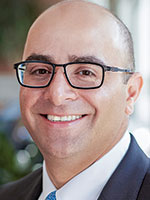Senior Reporter
XPO Ramps Up Trailer Production in Arkansas

[Stay on top of transportation news: Get TTNews in your inbox.]
XPO Logistics Chairman and CEO Brad Jacobs said recently that the company’s less-than-truckload network covers 99% of all North American ZIP codes. The trailers delivering to those locations come from its own trailer-making and refurbishing plant.
It is a private-label operation in Searcy, Ark., and places XPO in a unique position among carriers today who are hard-pressed to find trailers to quickly add to their fleets.
Greenwich, Conn.-based XPO reported it does not buy trailers from other trailer manufacturers; rather, it refurbishes its older ones and builds new trailers.
“This year, we’re building both 28-foot pups and 48-foot city vans. We also build straight trucks and converter dollies,” Mario Harik, acting president of the LTL unit and chief strategy officer at XPO Logistics, told Transport Topics.
“We’re on track to double production from last year after installing new equipment, which would add more than 4,300 new units into our network in 2022,” he said. XPO is looking to increase that number by another 50-100% in 2023 depending on the availability of raw materials.
“We’ve aligned on a one-trailer standard specification to streamline production,” he added.

Harik
Until its acquisition of Con-way in 2015, XPO had been an asset-light transportation company in North America.
Con-way had built its own trucks under the Freightliner brand, sold to Daimler AG in 1981, but at the time of the sale to XPO it was still making its own trailers.
Charles Willmott, former chief sales officer at trailer maker Strick, told TT that when XPO took over Con-way, it reached out to several trailer makers to do a cost comparison between the product they were getting out of Searcy and commercial trailers.
“They made it sound like they were going to close Searcy and actually buy trailers through the open market.”
That never happened. And Searcy remains a unique model. And aside from Con-way, “nobody else in my 45 years [in the trailer industry]” has done it, Willmott said.
“We came to understand quickly after the acquisition,” Harik said, “that being able to make our own trailers gave us a competitive advantage, thanks to a great process and great people.”
He said those advantages included:
- Avoiding the markups trailer makers typically charge for new trailers
- Recycling and refurbishment of certain parts at half the cost
- Maintaining control of the specs versus cookie-cutter trailers (XPO’s goal is to spec these trailers for a 14-year life)
- Ability to change specs during production runs
- Getting premium custom trailers at an entry-level price
At the other manufacturers, U.S. trailer orders, overall, edged past 26,000 in February, keeping pace with the past few months, ACT Research reported.
Preliminary data shows orders were 26,500 compared with 25,514 a year earlier, according to ACT, which noted the order pace that closed 2021 and opened 2022 continued for the third straight month in February. In January net orders were 26,595. In December they were 26,382.
February net US trailer orders of 27,041 units increased about 1% m/m and were 6% higher y/y. Before accounting for cancellations, new orders of 28.1k units were virtually unchanged versus January, but up almost 3% from the previous February.https://t.co/RKjs1eEn67 pic.twitter.com/STF39KawFM — ACT Research (@actresearch) March 25, 2022
Supply chain and staffing headwinds continue to challenge trailer makers in the face of what ACT termed extremely strong fleet demand for equipment.
Harik said another advantage XPO enjoys is it has been able to forecast its production a year in advance. “This is a real advantage for suppliers to source and secure raw materials for us.”
He added that coronavirus surges impacted production schedules due to an extremely tight labor market in 2021. “But so far in 2022, we are seeing the labor market for our manufacturing facility loosen and we’re seeing more applicants for open positions.”
In Searcy this fall, a meeting is planned for top drivers, mechanics and safety leaders at the plant for an equipment review, Harik said. “We’re always making changes to the specs to improve the operation, safety and repair aspects of the equipment we are buying and manufacturing.”
Harik added the engineering team at the plant was “looking at” electrified trailers and trailer telematics.
Another thing XPO is doing, for the first time this year, is keeping its used trailers and not selling them to third parties, he said, “even though beat-up, used trailers are going for elevated prices because of trailer makers’ production delays.”
Want more news? Listen to today's daily briefing above or go here for more info
In related news, XPO Logistics announced March 8 it is creating two new, stand-alone, publicly traded companies in the less-than-truckload and tech-enabled brokered transportation sector.
The logistics giant also announced that it plans to sell its European business, and has sold its North American intermodal operation for $710 million to pay down some of the company’s $3.3 billion debt.
XPO’s LTL business is growing. In 2021, it reported $4.1 billion in revenue with a profit of $618 million, compared with $3.5 billion in revenue and a profit of $487 million the previous year.
XPO’s LTL division has 12,000 drivers and 291 terminals nationwide with 7,900 tractors and 25,800 trailers.
XPO ranks No. 2 on the Transport Topics Top 50 list of the largest logistics companies in North America. It is No. 3 on the Transport Topics Top 100 list of the largest for-hire carriers.
— Associate News Editor Dan Ronan contributed to this article.

